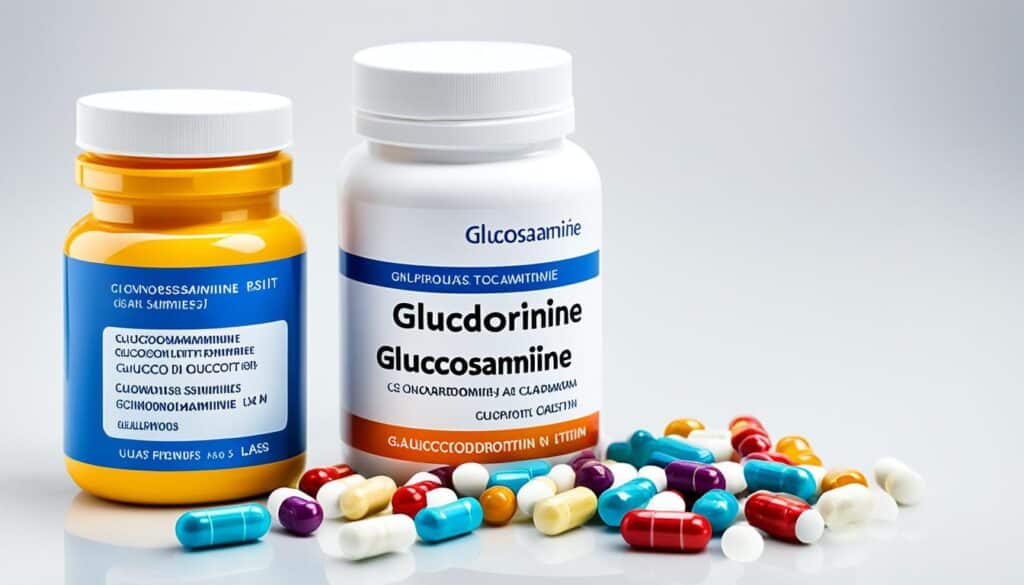Dog Joint Health is key to your dog feeling good and moving well. It helps them play and just enjoy life. Sadly, problems like hip dysplasia and arthritis are common in dogs. These issues can be painful and make it hard for dogs to move. While there’s no cure, joint supplements can do a lot to help. They work on the main problems, like rebuilding cartilage, so joints move better. They also help reduce inflammation, making dogs more comfortable.
Key Takeaways:
- Joint supplements can help manage and alleviate the symptoms of common joint issues in dogs, such as arthritis and hip dysplasia.
- Key ingredients in effective joint supplements include glucosamine, chondroitin, and MSM, which help rebuild cartilage and reduce inflammation.
- Supplements can improve joint function and mobility, providing relief for dogs suffering from joint pain and discomfort.
- Joint supplements are crucial for maintaining healthy joints in dogs, especially as they age and become more susceptible to joint problems.
- Consulting with a veterinarian is essential to determine the best joint supplement and treatment plan for your dog’s specific health needs.
Understanding Arthritis and Joint Issues in Dogs
Arthritis is a common condition that hurts many dogs as they get older. It’s an inflammatory disease that can make your dog lose their comfort and ability to move. It’s important to know what arthritis is, what causes it, and which joints it affects to help manage it and make your dog’s life better.
Definition and Causes of Arthritis
Arthritis means the joints inflame and lose their strength. This happens as the cushioning between bones, called cartilage, wears off. The bones then rub, causing pain. This is worsened by certain genes, injuries, growing old, and being overweight. So, taking care of dog joint health is key for pet owners.
Common Joints Affected by Arthritis
The disease can happen in many joints, but is most often seen in the hips, elbows, knees, and ankles. A common trigger is hip dysplasia, which is often hereditary. This makes the hip joint not form correctly. The condition can make moving, stiffness, and pain worse over time, affecting how dogs can use their joints and move.
Recognizing the Signs of Joint Problems in Dogs

Finding the early signs of joint problems in dogs matters a lot. It helps in better care and life quality. Common signs of arthritis are limping, difficulty getting up or lying down, not wanting to move or play, and acting different.
They might get angry or upset when you touch their sore spots.
Common Symptoms of Arthritis
Dogs with arthritis may show many changes. These include:
- Limping or moving less after rest or play
- Having a hard time getting up or not wanting to lie down
- Not wanting to move or play, and being less active overall
- Acting out or yelping when their sore joints are touched
Importance of Veterinary Consultation
Early diagnosis and treating joint problems is crucial. If you see the signs, get your dog to the vet soon. A vet can do a complete checkup, take x-rays and do other tests, and find the best treatment.
Finding joint issues early and getting vet care makes a big difference. It can help the dog feel better and be happier.
Managing Canine Osteoarthritis

Helping dogs with arthritis is often about using many steps to make them feel better. This includes things like medicine, helping them manage their weight, and using physical therapy. With these tools, pet owners can make life easier for their dogs with arthritis.
Treatment Options
For arthritis, dogs can take anti-inflammatory drugs and painkillers to feel better. They might also take supplements with glucosamine or omega-3. These help the joints move better and reduce pain.
If a dog’s arthritis is very bad, they might need surgery. But, this is a last resort after trying other treatments.
Lifestyle Changes
Changing how a dog lives can really help with arthritis. This can mean eating the right amount and type of food and doing exercises that are easy on the joints. Swimming and walking on soft grounds are great exercises for them.
It’s also important to make their living space comfortable and easy to move around in. A soft bed and ramps or stairs for high places can do wonders. Adding regular physical therapy to their routine can also make a big difference. This includes exercises and massages that keep their joints flexible and strong.
The Role of Supplements in Dog Joint Health

Joint health in dogs is greatly improved by supplements. These products fight inflammation and boost joint health. They are important for treating canine arthritis.
Experts make supplements to better your dog’s joint health. They aim at fixing cartilage, making joints move easier, and adding lubrication. Using these can ease your dog’s joint problems and slow down diseases.
Chat with a veterinarian to pick the best joint supplements for your dog. They’ll give you advice depending on your pet’s health and joint condition. Mixing supplements with other treatments like drug therapy, exercise, and diet changes is the best way. This helps your pet’s joints and life quality.
Glucosamine and Chondroitin

Glucosamine and chondroitin are widely studied joint supplements for dogs. They work together to fight the causes of arthritis and joint issues. This duo offers a broad solution to a common problem.
Benefits of Glucosamine and Chondroitin
Glucosamine is vital for cartilage health. It boosts new cartilage production while fixing the old. This process supports the joints and slow down their wear and tear. Chondroitin, meanwhile, fights inflammation and boosts joint movement.
By combining forces, glucosamine and chondroitin tackle many joint health aspects. They’re especially good for dogs with arthritis or joint issues. These supplements reduce pain, boost mobility, and delay further joint damage.
Forms of Glucosamine and Chondroitin Supplements
Glucosamine and chondroitin come in tablets, chews, and liquids. The best form depends on your dog’s needs and comfort. Some dogs like chews for the taste, while others may prefer liquids or tablets. Talk to your vet to pick the right form and dose for your pet.
Omega-3 Fatty Acids (Fish Oil)

Omega-3 fatty acids, like EPA and DHA from fish oil, help fight inflammation. They’re great for keeping your dog’s joints healthy. Studies show they cut inflammation, boost movement, and slow down joint wear and tear.
Anti-Inflammatory and Joint Health Benefits
These fatty acids stop the body from making harmful chemicals that can lead to joint pain and swelling. By reducing this activity, omega-3s can ease arthritis symptoms. This means better joint movement and less pain for dogs.
Omega-3s are not just anti-inflammatory. They’re also key for keeping your dog’s cartilage and joints strong. They boost the making of proteoglycans, which protect and lube the joints. Omega-3s can also help your dog’s body repair damaged cartilage.
If your dog has joint problems, adding omega-3 from fish oil to their meals can work wonders. It lessens inflammation, boosts how well they can move, and helps fight off joint damage. This can lead to a better life for your furry friend.
Dog Joint Health

Maintaining healthy joints for a dog is very important. It affects how they move, their comfort, and play. Many things influence joint health, like genetics, injury, age, obesity, and even Lyme disease.
Some dog breeds are more likely to have joint issues like hip dysplasia and osteoarthritis because of their genes. Injuries, such as tearing a ligament, can cause problems too. Over time, a dog’s joints naturally wear down. It’s made worse by extra weight, which is why staying fit is important.
To keep joints healthy, dogs need to manage their weight and stay active. Sometimes, physical therapy or joint supplements can help too. Seeing the vet regularly is also key. It lets you catch joint problems early, which means better care.
| Factors Affecting Dog Joint Health | Impact on Joint Health |
|---|---|
| Genetics | Predisposition to conditions like hip dysplasia and osteoarthritis |
| Injury | Ligament tears, joint dislocations, and other traumatic injuries leading to long-term issues |
| Age | Gradual wear and tear on joints, resulting in degenerative joint disease |
| Obesity | Additional stress and strain on joints, exacerbating existing problems |
| Lyme Disease | Potential joint inflammation and pain caused by the bacterial infection |
Knowing what affects joint health can help dog owners take better care. Being proactive helps keep their dogs healthy and happy. This way, their four-legged friends can have a great life and stay active for years.
Choosing the Right Joint Supplement for Your Dog

It’s key to pick the right joint supplement for your dog’s health. There are many choices, like tablets, chews, and liquid supplements. Knowing each one’s benefits is crucial.
Types of Joint Supplements
Joint supplements come in different forms, each with its perks. Tablets and chews are simple to give. But, liquid supplements work well for dogs who can’t have solid types or need an exact dose.
Make sure you pick a product from a reputable brand. Choose one that’s been third-party tested and has the NASC seal. This way, you know it’s safe and works.
Consulting with a Veterinarian
Always talk to your veterinarian before starting any supplement. They know what’s best for your dog, considering their health needs and more. This step makes sure the supplement is both safe and effective.
Working with your vet helps keep your dog healthy and happy. The right joint supplement can do a lot to help. It can boost their movement and life quality.
Combining Supplements with Other Treatments

Joint supplements are key in helping manage arthritis in dogs. They work best alongside other treatments. This way, your dog gets the care they need and joint symptoms can be lessened.
Medications and Physical Therapy
Vets might also suggest medicines like NSAIDs or pain relievers for your dog’s joint issues. These can work with supplements to give quick relief. Along with meds, physical therapy and exercises can make your dog’s joints stronger and healthier.
Diet and Weight Management
For arthritic dogs, keeping a healthy weight is very important. It reduces joint stress. A good diet and suitable exercise help maintain a proper weight and keeps joints from hurting. Talk to your vet about a plan for your dog’s diet and weight, which is a key part of their care.
| Treatment Option | Description | Benefits |
|---|---|---|
| Medications | Non-steroidal anti-inflammatory drugs (NSAIDs) and pain relievers prescribed by a veterinarian | Provide immediate relief from inflammation and pain |
| Physical Therapy | Therapeutic exercises, hydrotherapy, and massage | Improve joint mobility, strengthen surrounding muscles, and support overall joint health |
| Diet and Weight Management | Balanced diet and regular exercise to maintain a healthy weight | Reduce stress on joints and alleviate the burden of extra weight |
Top 10 Joint Supplements for Dogs with Arthritis

Joint supplements are key for managing arthritis in dogs. These supplements can lessen symptoms and boost joint health. They include glucosamine, chondroitin, and omega-3 fatty acids.
Glucosamine and Chondroitin Combination
The mix of glucosamine and chondroitin is a top choice. Glucosamine helps make cartilage, and chondroitin reduces swelling. Together, they enhance joint fluid, lessen pain, and stop arthritis progression.
Omega-3 Fatty Acids (Fish Oil)
Omega-3s from fish oil fight joint swelling. They ease pain and improve joint health. For dogs with arthritis, these can slow joint damage.
Other Popular Joint Supplements
Besides glucosamine, chondroitin, and omega-3s, other supplements help dogs with arthritis. They are:
- MSM (Methylsulfonylmethane): This compound eases swelling, pain, and supports mobility.
- Avocado and Soybean Unsaponifiables (ASU): Plant compounds that reduce inflammation and boost joint use in arthritic dogs.
- Green-Lipped Mussels: They offer unique nutrients to lessen joint swelling and pain.
- Undenatured Type II Collagen: It boosts the body’s joint protectors, aiding joint health.
Also Read: Dog Ear Cleaner the Ultimate Buying Guide: Choose Wisely, Love Your Pet Dearly in 2023
Conclusion
In closing, keeping a dog’s joints healthy is vital for their well-being. It affects how they move, feel, and play. Joint health is key to a dog’s happiness and quality of life.
To help with arthritis, which can lower a dog’s quality of life, a variety of treatments are available. This includes essential supplements like glucosamine, chondroitin, and omega-3 fatty acids. These can reduce swelling, repair joint tissues, and make joints move smoother.
When thinking about these supplements, talking to a vet is a must. A vet can give advice tailored to your dog’s health. They ensure any treatment is both safe and effective. This advice, combined with other methods like medication, therapy, and managing your dog’s weight, can greatly help keep your dog’s joints in good shape. This will boost their enjoyment of life.
FAQs
Q: What are the common signs of joint pain in dogs?
A: Common signs of joint pain in dogs include limping, stiffness, difficulty getting up or down, reluctance to walk or exercise, swelling around the joints, and yelping when touched in a certain area.
Q: How can joint supplements help in maintaining joint health for dogs?
A: Joint supplements may support joint health by providing key nutrients such as glucosamine, chondroitin, and MSM, which can help reduce inflammation, improve joint mobility, and slow down the progression of joint disease.
Q: Are vet-recommended joint supplements beneficial for dogs?
A: Yes, vet-recommended joint supplements are formulated to support joint health and reduce inflammation in dogs, making them beneficial for dogs experiencing joint pain or stiffness.
Q: What are the top 10 supplements for dogs with joint issues?
A: The top 10 supplements for dogs with joint issues include glucosamine, chondroitin, MSM, omega-3 fatty acids, turmeric, green-lipped mussel, collagen, hyaluronic acid, Boswellia, and yucca.
Q: How do joint chews or soft chews work for dogs with joint problems?
A: Joint chews or soft chews for dogs contain ingredients that support joint health and mobility, such as glucosamine and chondroitin, which help reduce inflammation, improve joint function, and alleviate pain.
Q: Can joint supplements help senior dogs with joint pain?
A: Yes, joint supplements can help senior dogs with joint pain by providing essential nutrients that support joint function, reduce inflammation, and promote overall joint health, allowing them to maintain mobility and comfort in their golden years.
Q: How do supplements help a dog prone to joint issues?
A: Supplements help dogs prone to joint issues by providing key nutrients that support joint health, reduce inflammation, and improve joint function, helping to prevent joint problems and maintain overall joint health in the long run.
Source Links
- https://www.vet.cornell.edu/departments/riney-canine-health-center/canine-health-information/how-joint-supplements-can-help-orthopedic-conditions
- https://www.simonvetsurgical.com/news/the-top-10-supplements-for-dogs-with-arthritis
- https://www.springtimeinc.com/product/joint-health-oa-plus-dogs/Natural-Dog-Supplements




